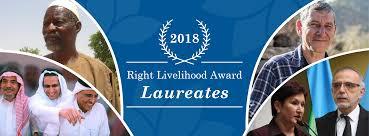
https://www.rightlivelihoodaward.org/media/2018-right-livelihood-award-l...
The Right Livelihood Award was established in 1980 to “honour and support courageous people and organisations offering visionary and exemplary solutions to the root causes of global problems”. It has become widely known as the 'Alternative Nobel Prize' and there are now 170 Laureates from 69 countries.
The 2018 Honorary Award goes to anti-corruption champions Thelma Aldana (Guatemala) & Iván Velásquez (Colombia) “for their innovative work in exposing abuse of power and prosecuting corruption, thus rebuilding people’s trust in public institutions.”
Thelma Aldana commented: “The Right Livelihood Award is a recognition of the struggle of the Guatemalan people against corruption, and that it is possible to combat these criminal activities. The construction of a true democracy in Guatemala requires an independent and strengthened judicial system.”
Iván Velásquez commented: “This prize comes at a particularly dramatic moment in the fight against impunity and corruption. It is very important because it will turn the eyes of the world to Guatemala, and hopefully also provide international solidarity with those who are committed to the transformation of the country.”
The three cash awards go to the following Laureates:
The civil and human rights defenders Abdullah al-Hamid, Mohammad Fahad al-Qahtani and Waleed Abu al-Khair (Saudi Arabia) share an Award “for their visionary and courageous efforts, guided by universal human rights principles, to reform the totalitarian political system in Saudi Arabia”. It is the first time that a Right Livelihood Award goes to Laureates from Saudi Arabia.
The Laureates are all currently in jail. In 2013, al-Hamid and al-Qahtani were sentenced to 11 and 10 years’ imprisonment on charges including “inciting disorder by calling for demonstrations” and “forming an unlicensed organisation”. Abu al-Khair was sentenced to 15 years’ imprisonment in 2014 for charges including “disobeying the ruler” and “harming the reputation of the state by communicating with international organizations”.
The farmer Yacouba Sawadogo (Burkina Faso) receives the Award “for turning barren land into forest and demonstrating how farmers can regenerate their soil with innovative use of indigenous and local knowledge”.
Sawadogo commented: “I am very honoured to receive the Right Livelihood Award, which will allow me to persist in my efforts to protect the forest and the wildlife. I hope that the legitimacy provided by this prize will help inspire and encourage many others to regenerate their land for the benefit of nature, local communities and future generations.”
The agronomist Tony Rinaudo (Australia) is recognised by the Jury “for demonstrating on a large scale how drylands can be greened at minimal cost, improving the livelihoods of millions of people”.
Rinaudo commented: “Receiving the Right Livelihood Award is a great honour and I am humbled. Even though this simple, low cost and rapid method of reforestation has had a very significant impact on the lives of millions of people, globally it is little known to national governments, donors, or communities who need it the most. It is my hope that the spotlight now, through this prize, being shone on farmer-managed natural regeneration methods will result in exponential uptake and increase the spread of it globally.”
The announcement was made at the International Press Centre at the Swedish Ministry for Foreign Affairs by Ole von Uexkull, Executive Director of the Right Livelihood Award Foundation, and Amelie von Zweigbergk, board and jury member of the Foundation, following the decision by an international Jury that considered 107 nominations from 50 countries.
Ole von Uexkull commented: “The Laureates’ trailblazing work for accountability, democracy and the regeneration of degraded land gives tremendous hope and deserves the world’s highest attention. At a time of alarming environmental decline and failing political leadership, they show the way forward into a very different future.”
The three cash awards are worth SEK 1 Million (EUR 96,000) each and will be used to support the Laureates’ successful work. The prize money is not for personal use.
The Award Presentation will take place in Stockholm on 23 November, followed by public events and high-level meetings in Geneva, Zurich and Berlin.
About the Award
Presented annually in Stockholm, the Right Livelihood Award is usually shared by four Recipients. The prize money shared by all Laureates is SEK 3 million (2017) but not always all Laureates receive a cash award. Often an Honorary Award is given to a person or group whose work the Jury wishes to recognise but who is not primarily in need of monetary support. The prize money is for ongoing successful work, never for personal use.
Unlike the Nobel Prizes and most other international prizes, the Right Livelihood Award has no categories. It recognises that, in striving to meet the human challenges of today’s world, the most inspiring and remarkable work often defies any standard classification.
The Right Livelihood Award is not an award for the world’s political, scientific or economic elite, but an award for the people and their work and struggles for a better future. The Laureates come from all walks of life: they are farmers, teachers, doctors, or simply, concerned citizens. The Right Livelihood Award accepts proposals from everyone through an open nomination process.
The presentation of the Right Livelihood Award is only the start of a long relationship between the Laureate and the Foundation. The Foundation sees its role as being the megaphone and shield for the Laureates, and provides them with long-term support.
Here a great article from DW
https://www.dw.com/en/right-livelihood-award-honors-practical-fixes-to-g...










Add new comment